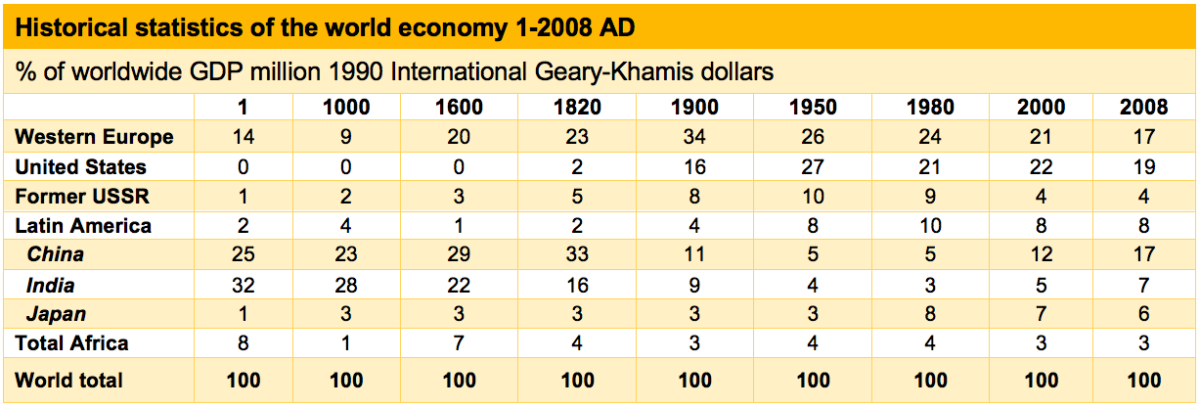Being in Macau for ESOMAR’s Asia Pacific Conference gave me the occasion to reflect on the role of China in the history of the global economy. My first trip to China was in 2007 when I read about its present and future challenges and its history. Since then, I’ve had the opportunity of occasionally travelling to the region to refresh my framework of references.
Before the Western industrial revolution in the nineteenth century, India and China together accounted for half of the world’s GDP. When the Western countries progressed in technology significantly ahead of these two vastly populated countries, their relevance fell dramatically (see Table).

Resurgence
Deng Xiaoping, the leader of the People’s Republic of China between 1978 and 1992, knew how to read the signs of the time. He perfectly understood that the only way back to relevance was to command technology. This was the core of his ‘Socialist market economy’. Four decades later, the fierce dispute about technological dominance between the United States and China can be explained by this fact. The supremacy of Artificial Intelligence (AI), robotics, cyber-security, apps platforms and the 5G network will determine who has pre-eminence in the worldwide economy.
If we think of the market research and insights profession, what are the signs of our time? Let me suggest two avenues: the digitisation of our societies and the ethical implications it brings.
The accelerated digitisation of our societies bring a never imagined capability of collecting information about people’s lives. Today, technology gives us the chance of collecting data about what people do, like, view, think, prefer, share, purchase and share in both the digital and physical spaces. Never before, have customer centricity and customer understanding been so central and at the core of businesses and organisations. Never before, have we, professionals in deciphering people’s motivations, had so many typologies and sources of data to work with. And therefore our profession is experiencing a deep transformation.
We are entering a new paradigm: ‘Traditional’ market researchers are no longer the gatekeepers of information; data collection and its treatment and analysis benefit from the new technology available. This is why our profession has extended into the world of analytics.
New capabilities
Our challenge is that today, the hat of consumer and customer understanding, is not only worn by traditional market researchers. Today, new professionals endowed with new capabilities also wear it.
As a sector we have the great challenge of combining the best of more than 100 years of professional expertise with the new capabilities that technology and new professionals bring.
We are talking about two approaches to the same objective that must be complementary, merged so that we obtain the best results from their symbiosis. For this, both sides have much to learn from each other, without fear or complexity. A new professional identity is emerging: the Data Translator – the professional who brings domain knowledge to the unstructured data; the professional who understands what the relevant business question is and establishes the most pertinent approach for methodology and datasets; the expert who separates the wheat from the chaff and overcomes the so feared final “so what?” question.
We are heading towards the ‘democratisation’ of data and insights.
We are heading towards the ‘democratisation’ of data and insights. Automated DIY applications, data pipelines feeding multiple platforms and the implementation of AI in data collection and analysis processes encourage people outside market research to access data and insights directly. The emergence of black boxes, the prioritisation of speed and price and the ‘good enough is good’ approach makes us question: what about rigour, provenance and quality control?
Ethics
We all know that technology is not neutral. Technology is the reflection of the knowledge of the context, the objectives, the ethical code and the biases of its creator. Market research, and in particular ESOMAR, have a proven record of self-regulation based on strong ethical principles; ethical principles applied to the management and treatment of peoples’ data. With the multiple scandals about how the tech giants treat personal data, shouldn’t we take the lead in the implementation of ethics and our code of conduct in the insights industry at its broadest scope? Shouldn’t we take the lead in the proper development of these technologies in our extended realm?
Most recently, ESOMAR has taken the leading role in negotiating the outcome of the EU GDPR as well as the Copyright directive which threatened to deeply harm the practice of social media research and text mining – the latter of course, being the fundamental starting point of any machine learning capability. As a collective we have power, the power of being influential in the formulation of these laws that affect our profession. As individuals, the legacy of the insights profession today takes on an even greater value – the value of identifying the relevant questions and providing the relevant answers to make the best decisions.
Together, let us read the signs of our time, embrace the evolution of our industry and steer our profession to a promising and sustainable future.


